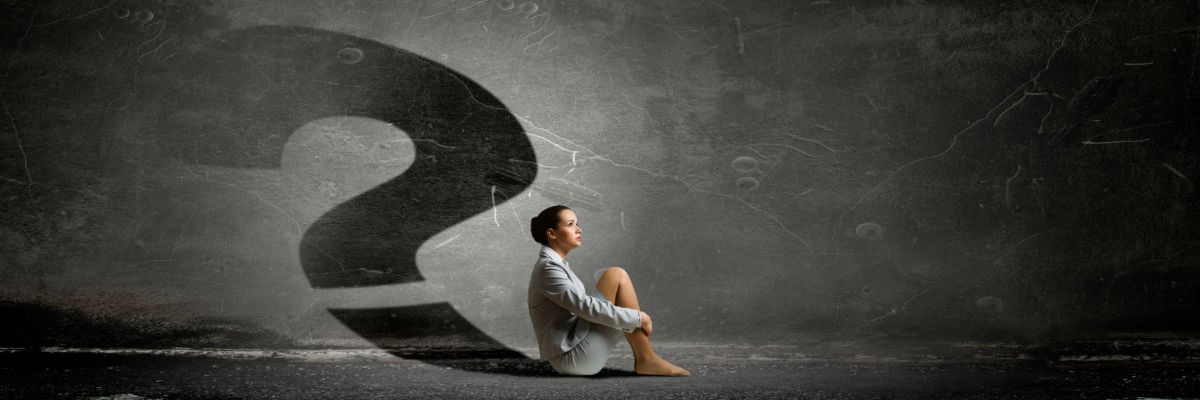
Few Christians can honestly say they have never had their belief in God tested. Most of us have encountered difficulties along the path of faith and have been tempted, perhaps when experiencing suffering and evil, to reconsider our convictions.
Not even the saints are exempt from such temptations. Mother Teresa, for example, experienced profound temptations to religious doubt. In a letter to her confessor, she wrote, “Do not think that my spiritual life is strewn with roses—that is the flower which I hardly ever find on my way. Quite the contrary, I have more often as my companion ‘darkness.’”
To some, this might appear scandalous. How can saints experience such temptations? And what should we, who are far less holy, make of our own hesitations to believe?
Before we move forward, I should clarify what I mean by the term doubt. I do not mean what Bl. John Henry Newman meant in his Apologia Pro Vita Sua when he noted, “Ten thousand difficulties do not make one doubt. . . . Difficulty and doubt are incommensurate.” Here he refers to a willful rejection of belief. In contrast, what I mean here by doubt is closer to what Newman meant by difficulty.
Doubt presupposes belief, or the acceptance of something as true based on the authority of another—and wherever belief is, doubt tends to follow. Why? Because we are keenly aware of human fallibility. We know we can (and do) get things wrong or partially right, and we know that this is true about others. So no matter how certain we might feel in our convictions, there is always a chance that a “perhaps” moment of doubt will surface. “Perhaps I am wrong,” we might admit. “Perhaps it isn’t true.”
When it comes to spiritual matters, doubt and belief come as a package deal. It is not only believers who must face this reality, but unbelievers, too. Even the most hardened atheist must eventually choose to accept a truth about what he cannot see. And he must face the fact of his own intellectual limitations. Thus, a “perhaps” moment is no less likely for the unbeliever: “Perhaps it is true,” he may privately and even painfully wonder.
The point is that doubt can be understood as a natural possibility that arises from authentic belief. Thus, Pope Benedict XVI (as Cardinal Ratzinger) wrote in his Introduction to Christianity:
Both the believer and the unbeliever share, each in his own way, doubt and belief if they do not hide from themselves and from the truth of their being. Neither can quite escape either doubt or belief; for the one, faith is present against doubt; for the other, through doubt and in the form of doubt.
Atheism, or the willful rejection of God’s existence, is a sin against the virtue of religion since God has adequately revealed himself in nature (Catechism of the Catholic Church 2125, Rom. 1:18). So doubt in the absolute sense is bad. But doubt in the form of a temptation is—like any temptation we experience passively—not a sin. In fact, inasmuch as it stimulates us to contemplate further the mysteries of Christianity, a trial of faith may refine and strengthen our religious conviction and thus be considered a good. Fr. Dwight Longenecker suggests that we “experience trials in the faith for three reasons: to strengthen us, to clarify our beliefs, and to help us proclaim the gospel.”
Doubt compels us to examine our deepest convictions about reality. And as Socrates implied in one of his famous maxims, only the examined life is worth living. Therefore, doubt makes life interesting because it forces us to think about reality. It awakens the mind and restores the will. It compels us to make new or renewed decisions about where we are going in life. G.K. Chesterton, a convert from agnosticism, understood the potential value of doubt when he remarked, “Man must have just enough faith in himself to have adventures, and just enough doubt of himself to enjoy them” (Orthodoxy).
A good illustration of the tension between doubt and belief can be found at the Council of Elrond in Tolkien’s Lord of the Rings, when Frodo vows, “I will take the Ring, though I do not know the way.” It is clear that Frodo doesn’t know how he is going to pull it off. It is also clear that his will is fixed: he will march forward despite the thousand difficulties clamoring in his imagination.
When we face doubts—or difficulties—regarding our belief as Catholics, we encounter a similar choice. Will we march forward in faith and seek out answers? Or will we turn our backs on the path we have trodden in faith? It is only when the believer chooses unbelief that doubt results in sin. It all comes down to the will.
Mother Teresa, like all the other saints who experienced severe temptations to doubt, had an iron will. When she wrote in the above letter to her confessor that she has had “more often as [her] companion ‘darkness,’” she did not end her thoughts there. In fact, the next line revealed the true depth of her faith, despite extreme trial: “And when the night becomes very thick—and it seems to me as if I will end up in hell—then I simply offer myself to Jesus.”
She overcame doubt, above all, by standing firm in her faith and entrusting herself to the Savior she knew but could not feel. The little saint of Calcutta chose to walk by faith and not by sight, and we are all called to do the same. For “the men signed of the cross of Christ,” as Chesterton muses in his Ballad of the White Horse, “go gaily in the dark.”



